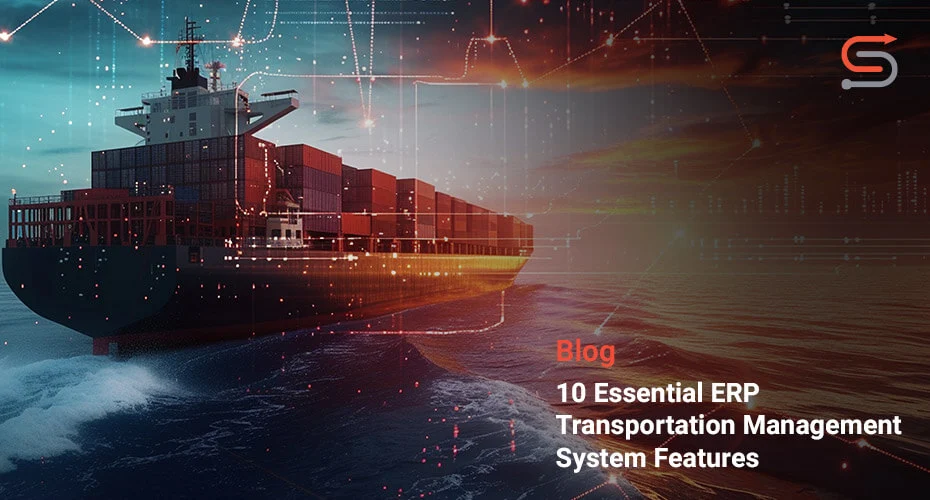

January 22, 2024 - by Manoj Nair
For the manufacturing industry, managing logistics and supply chain brings new challenges every day. From meeting customer demands for efficiency and improved margins, to effectively managing your routes and carriers – transportation requires accuracy, speed, and flexibility to improve compliance, minimize costs, and maximize resources.

ERP transportation management systems facilitate seamless interaction between your order management system and warehouse management system. Irrespective of your fleet’s strength, transport ERP software can provide the ideal solution for all of your transportation operations, helping you overcome overhead expenses, unanticipated break-fix scenarios, and abrupt downtime.
Transportation management systems are vital to supply chain management because they affect all aspects of the process, such as planning, procurement, logistics, and lifecycle management. An effective system can simplify transportation planning and execution, which can lead to better customer satisfaction. In today’s constantly changing global trade environment, it’s crucial to have a system that can assist in successfully navigating complex regulations and trade policies.
According to a study by Deloitte, global freight volume is forecast to surge to 92.1 billion tons in 2024. Manufacturers looking to cater to this high increase in volume need to invest in modern Transportation ERP Software. With the right Transportation Management System in place, you can accurately forecast demand and shipment volumes, reduce transportation complexity, and solve all your freight problems.
A Transportation Management System can even improve business profitability across the supply chain, by offering the following benefits:
As the manufacturing C-suite struggles with evolving challenges, the right ERP for transport company can help enhance freight management, consolidate orders, and maximize the return on your transportation spend. It can also enable real-time visibility into domestic and international shipping across all transportation modes – allowing you to achieve all your transportation goals.
Here are 10 essential Transport ERP Software features:
With Transportation ERP Software, you can streamline the requirements management process. By integrating your transportation order processing with order-to-cash and order-to-pay processes, you can get much-needed visibility into your requirements. You can also centralize transportation management requirements, reduce redundant tasks, and focus on value-added activities.
A modern Transportation Management System can allow you to plan, consolidate, and optimize shipments while simultaneously considering constraints, costs, and penalties. It can aid in addressing international trade and restricted goods management requirements, helping you reduce spend and maintain required levels of customer service.
When you choose the right Transport ERP Software, you can collaborate with carriers, reserve capacity for shipments, change booking confirmations and shipping instructions, and better coordinate transportation activities. By tendering orders to one or many carriers, you can choose the preferred carrier for your shipments based on optimization and ranking techniques.
ERP for Transport company can enable you to manage communication with carriers, dispatch and track freight orders, and maintain necessary documentation. Full integration to your warehouse management system enables faster, more dynamic, and responsive logistics execution and improved cargo handling.
Transportation ERP software can help evaluate a large pool of orders. It can help you determine the optimal transportation mode, route, and carrier to minimize expenses within the required customer service level constraints.
With the right Transport ERP software in place, you can check the availability of docks for loading and unloading items. You can receive notifications for scheduled appointments and circumvent issues when more than one carrier arrives at a given location at a given time.
A robust Transportation Management System can help in effective planning for dispatch; you can cumulatively dispatch material from multiple sales orders and achieve the required flexibility to plan dispatch and loading effectively.
With ERP transportation management, you can easily and efficiently manage actual exchange of cash between your company and cost or revenue centers, such as freight invoicing, and accounting. You can also reduce errors on invoices paid and ensure more accurate freight ratings.
An ERP for Transport Company can deliver critical insight into important KPIs. You can view a variety of metrics such as percentage of on-time pick up, percentage of on-time delivery, cost per metric, productivity in operational or monetary terms, and percentage utilization and make the right business decisions.
With Transportation ERP Software, you can carry out the required physical or administrative operation regarding transportation. You can get event by event traceability of transport, custom clearance, invoicing, delivery of shipment, etc. and also set the alerts of your choice.
ERP transportation management systems are critical to the efficient functioning of any modern organization. But Transport ERP Software is a complicated collection of functionalities. Therefore, it is important that you understand your transportation process and identify critical requirements. You can then accordingly select the required transportation functionalities and make sure that the ERP transportation management system you choose is strong in all the areas that are key to your success.
Transportation ERP Software implementation is a major financial commitment. Careful in-house planning and controls, expert consultants, and a fitting technology that meets business needs is imperative to ensure success of your transport ERP business application deployment within the manufacturing sector.